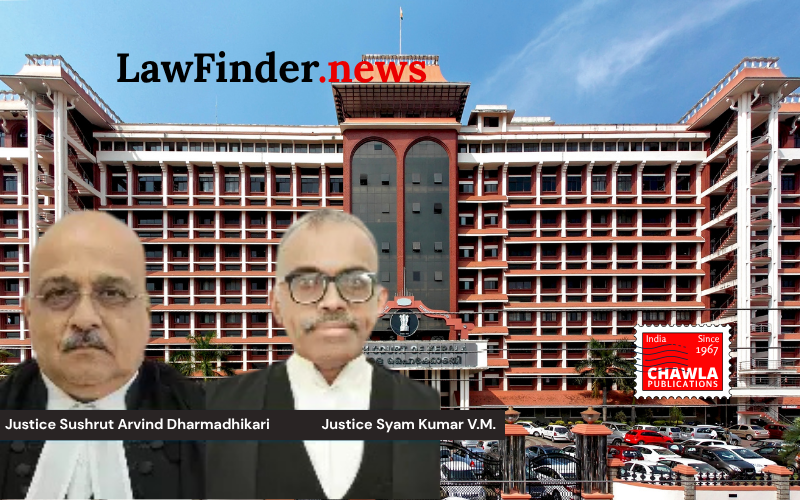Court rules 1950 endowment deed is a gift deed, not a waqf deed; declares Kerala Waqf Board’s 2019 waqf registration as legally unsustainable and affirms State’s right to investigate bonafide occupants' interests.
In a significant judgment dated October 10, 2025, the Kerala High Court (Division Bench) set aside a Single Bench decision that had quashed the State Government’s notification constituting an Inquiry Commission (IC) to investigate disputes relating to a large property in Vadakkekara village, Kozhikode district. The property in question, measuring originally over 404 acres but reduced to about 135 acres due to natural causes, had been declared a waqf property by the Kerala Waqf Board (KWB) in 2019. The declaration led to widespread protests by bonafide occupants and third-party owners who had purchased land parcels decades earlier.
The core issue revolved around whether the 1950 endowment deed transferring the property to the Farooq College Management Committee (R5) was a ‘waqf deed’ - implying permanent dedication to religious or charitable purposes under Muslim law - or a ‘gift deed’, allowing alienation and transfer of property by the donee. The writ petitioners challenged the constitution of the IC on grounds that it violated the Waqf Act, 1995, which bars executive interference once a property is declared a waqf and entrusts jurisdiction exclusively to the Waqf Tribunal.
The Division Bench, however, found the Single Bench’s ruling to be erroneous and disagreed with the quashing of the IC. The Court held that:
- 1. Locus Standi: The writ petitioners lacked locus standi as they failed to show direct personal injury from the IC’s constitution and were effectively proxy litigants. The Court emphasized that only persons with immediate interest or ‘persons aggrieved’ can invoke writ jurisdiction, especially in matters involving waqf properties.
- 2. Nature of Endowment Deed: A detailed analysis of the 1950 deed and applicable Waqf statutes (Mussalman Waqf Act, 1923; Waqf Act, 1954; and Central Waqf Act, 1995) revealed absence of ‘permanent dedication’-a sine qua non for waqf creation. The deed explicitly permitted the donee to transfer and alienate property and contained a reversion clause to donor heirs if the college ceased to function. The Court held the deed was a gift deed, not a waqf deed.
- 3. Validity of Waqf Declaration by KWB: The Court scrutinized the 2019 declaration of the property as waqf by the KWB and found it legally unsustainable due to:
- - Unexplained delay of nearly 70 years in registration and notification.
- - Lack of mandatory preliminary survey and quasi-judicial inquiry involving all interested parties before declaration, as required under sections 4 and 5 of the Waqf Act, 1954 and corresponding provisions of the 1995 Act.
- - Absence of official gazette notification.
- - Failure to consider bonafide third-party owners and occupants, whose rights and livelihoods were affected.
- The Court described the KWB’s action as a ‘land-grabbing tactic’ lacking bonafides and held the declaration does not bind the State Government.
- 4. State Government’s Powers and Inquiry Commission: The Court upheld the State’s right to constitute the IC under the Commissions of Inquiry Act, 1952, emphasizing that the IC’s role is fact-finding and recommending measures to protect the rights of bonafide occupants. The Court noted the State Government’s statutory power under Section 97 of the Waqf Act, 1995 to issue directions to the Waqf Board and manage waqf affairs in public interest.
- 5. Role of Waqf Tribunal and Writ Court: While acknowledging Supreme Court rulings that disputes over waqf properties fall within Waqf Tribunal jurisdiction, the Court held that where the very creation of waqf is in question and statutory procedures are not followed, the writ court can intervene to examine legality. The Court cited precedents including Salem Muslim Burial Ground Protection Committee v. State of Tamil Nadu and State of Andhra Pradesh v. Andhra Pradesh State Waqf Board to support its stance.
- 6. Impact on Third Parties: The Court acknowledged the severe impact of the KWB’s waqf declaration on hundreds of bonafide purchasers, owners, and occupants who had constructed businesses and homes over decades. It emphasized the need for fair inquiry and protection of fundamental rights to property, livelihood, and business.
The Division Bench set aside the Single Bench judgment and allowed the writ appeal, directing the IC to proceed with inquiry and prepare a comprehensive report. The State Government was empowered to act upon the report and issue necessary directions under the Waqf Act to protect affected parties. The Court’s decision safeguards the interests of bonafide occupants while ensuring that waqf declarations comply with statutory procedures and principles of fairness.
This judgment is a landmark ruling clarifying the legal contours of waqf creation, the importance of procedural compliance in waqf registration, and the balance between protecting waqf properties and safeguarding constitutional rights of citizens.
Statutory provision(s): Commissions of Inquiry Act, 1952; Mussalman Waqf Act, 1923; Waqf Act, 1954; Waqf Amendment Act, 1984; Central Waqf Act, 1995 (Sections 3, 4, 5, 6, 25, 26, 36, 40, 55E, 83, 87, 97), Code of Civil Procedure, 1908 (relevant procedural powers), Constitution of India (Articles 19, 21, 226, 300A)
State of Kerala v. T.K.I. Ahamed Sherief, (Kerala)(DB) : Law Finder Doc Id # 2792169




